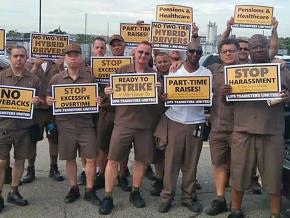We have to fight for the contract we deserve
A UPS worker describes the struggle ahead for Teamsters in their contract fight with the multimillion-dollar package delivery giant.
THE TEAMSTERS bargaining committee and UPS announced on June 21 a tentative agreement “in principle” on a national contract that is set to expire on July 31.
UPS was triumphant in their press release:
UPS’s goal has been to reward the company’s employees for their contributions to its success while enabling the business to remain flexible to meet its customers’ needs — each of these goals have been met in the new agreement. UPS is well-positioned to grow and meet the needs of its customers.
The business media have reported that this agreement is a done deal, mouthing the company position that the contract is basically signed, sealed and delivered to reassure businesses that a possible strike won’t hinder their logistic needs.

The reality is that this contract fight is far from over, even if the Hoffa administration and UPS executives pretend that everything is business as usual.
There’s the small matter of 260,000 rank-and-file Teamsters who have to vote on the national deal and also the working out of the supplements that pertain to certain regions of the country. Negotiators also still have to negotiate a separate agreement covering UPS Freight.
As long as one supplement isn’t ratified, the contract can’t go into effect. This is exactly what happened in 2013.
ONLY SOME of the contract highlights have been made available to the membership, but it’s clear that what has been agreed upon is more concessions to UPS, including giving management more flexibility to create a new tier for package car drivers that will pay $6 less an hour and raises that are inadequate.
Teamsters bargaining committee co-chair Denis Taylor is so worried that the membership will be upset with this tentative agreement that he put out a statement concerned about resistance to the deal:
I am confident that once the membership has reviewed and understood the changes, they will see that this agreement is among the very best ever negotiated for UPS members...I also remind the membership, once again, that they should not rely on the misinformation that is circulating on the Internet. The groups that are generating that misinformation do not have your best interests in mind.
Taylor won’t give the specifics until all of the supplements are have been worked out in negotiations. Yet he expects us to think this is a great deal.
Given what we know with the new tier in package car, the automated hubs that UPS is building or retooling in existing locations, and the Hoffa administrations lousy track record at UPS and other companies, we shouldn’t trust him.
According to information provided by UPS Teamsters United, the new start pay for part-time new hires will go from $10 an hour to $13, but that’s still lower than the minimum wage in parts of the country. And there are no catch-up raises for existing part-timers.
Back in the late 1970s part-timers started out at $12 an hour, but a concessionary contract in 1982 reduced the start pay to $8 an hour. It has taken almost four decades to make it beyond the pay of the 1970s.
The new general wage increase will be $4.15 over five years, less than a dollar a year. This is a major insult after UPS CEO Mike Abney increased his total compensation by $10 million over the last five years.
There is no information yet about whether new 22.3 inside full-time jobs (named for the article of the 1997-2002 contract agreement that forced management to combine two part-time jobs to create a full-time position) will be created — an important issue since UPS has over the decades destroyed inside full-time jobs and replaced them with part-time ones.
The process of reversing this occurred during the 1997 strike, but since then, little headway has been made to create inside full-time jobs even though the number of UPS workers is expanding.
THE HOFFA administration called for a national strike authorization vote in May — something it didn’t do during the last contract fight — and 93 percent of UPS and 91 percent of UPS Freight voted to authorize a walkout.
The vote reflected the high level of anger and frustration among UPS workers and the willingness to fight back. But rank-and-file workers also face obstacles to organizing the fightback we need at UPS, including Hoffa’s negotiating team, which is more interested in concessions than fighting for the contract we deserve.
In several UPS hubs, workers held Unity Rallies from June 18 to June 22 to show their support for a better contract. We need more of these workplace rallies. And once again, just like the last contract in 2013, a “Vote No” campaign is more important than ever.
Hoffa and Taylor need to be forced to go back to the negotiating table, and we, the rank and file, need to have discussions at work and during local contract meetings on how to pressure Hoffa, Taylor and our local leaders to prepare for a strike.
Negotiations are scheduled for July 9-12 in Minneapolis on outstanding agreements. According to Teamsters United, following those negotiations, a two-person meeting will be held with two representatives from every Teamster local that represents UPS Teamsters.
Hoffa and Taylor need to inform the membership about the negotiations so we know what is actually happening, instead of the dribs and drabs that are spun to make this seem like a great contract.
Even with the limited information on the tentative agreement from the Hoffa administration, this is enough to vote down this concessionary agreement.
We still need to prepare and pressure Hoffa and Taylor to use members’ strike authorization vote and back it up with real action instead of the same old rhetoric about how once again they negotiated a great contract when we know from our working conditions that this is a lie.


